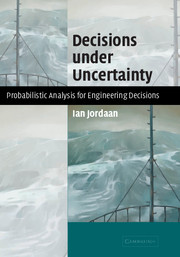Book contents
- Frontmatter
- Contents
- List of illustrations
- Preface
- Acknowledgements
- 1 Uncertainty and decision-making
- 2 The concept of probability
- 3 Probability distributions, expectation and prevision
- 4 The concept of utility
- 5 Games and optimization
- 6 Entropy
- 7 Characteristic functions, transformed and limiting distributions
- 8 Exchangeability and inference
- 9 Extremes
- 10 Risk, safety and reliability
- 11 Data and simulation
- 12 Conclusion
- Appendix 1 Common probability distributions
- Appendix 2 Mathematical aspects
- Appendix 3 Answers and comments on exercises
- References
- Index
4 - The concept of utility
Published online by Cambridge University Press: 05 June 2012
- Frontmatter
- Contents
- List of illustrations
- Preface
- Acknowledgements
- 1 Uncertainty and decision-making
- 2 The concept of probability
- 3 Probability distributions, expectation and prevision
- 4 The concept of utility
- 5 Games and optimization
- 6 Entropy
- 7 Characteristic functions, transformed and limiting distributions
- 8 Exchangeability and inference
- 9 Extremes
- 10 Risk, safety and reliability
- 11 Data and simulation
- 12 Conclusion
- Appendix 1 Common probability distributions
- Appendix 2 Mathematical aspects
- Appendix 3 Answers and comments on exercises
- References
- Index
Summary
‘Your act was unwise,’ I cried, ‘as you see
By the outcome.’ He calmly eyed me:
‘When choosing the course of my action,’ said he,
‘I had not the outcome to guide me.’
Ambrose BierceConsequences and attributes; introductory ideas
We have shown that two ingredients are combined in our decision-making: probability and utility. But utility has not been well defined. Up to this point, we have given detail of the probabilistic part of the reasoning. We now present the basic theory with regard to utility. Probabilities represent our opinions on the relative likelihood of what is possible, but not certain; utilities encode our feelings regarding the relative desirability of the various consequences of our decisions. Examples of where utilities fit into the decision-making process were given in Section 1.2. A special case is expected monetary value (EMV), dealt with in Section 3.5.2.
There can be various components of utility, depending on the application. These components will be referred to as ‘attributes’. For example, in a study of airport development for Mexico City, de Neufville and Keeney (1972) considered attributes of the following kind.
cost
airport capacity
safety
access time
noise
displacement of people.
There will usually be a set of such attributes, which depends on the problem at hand. Attributes may have
increasing value, for example money, profit, volume of sales, time saved in travelling, and wilderness areas available for enjoyment
decreasing value, for example size of an oil spill, level of noise pollution, and deaths and injuries in an accident.
- Type
- Chapter
- Information
- Decisions under UncertaintyProbabilistic Analysis for Engineering Decisions, pp. 162 - 219Publisher: Cambridge University PressPrint publication year: 2005



